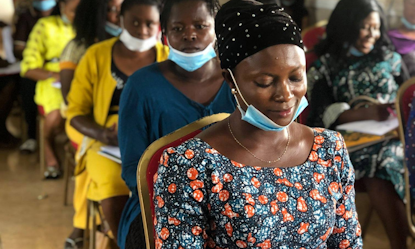Lift off: Ekiti State is empowering women businesses through better procurement practices

Ekiti, located in Southwest Nigeria, is one of the smallest states in the country but has proven to be something of a giant when it comes to taking modern approaches and fostering partnerships for development. The Ekiti State Bureau of Public Procurement (EKBPP) is leveraging this healthy ecosystem as a springboard to reform the state’s procurement process to be more equitable, inclusive, transparent, and user-friendly from start to finish.
In particular, they are focusing their efforts on expanding economic opportunities for smaller and women-led businesses, who dominate the local economy but rarely take part in public procurement. The reform project, which was launched publicly by the government on 10 February, will build on the state’s existing infrastructure for transparency with its easy-to-use, OCDS-based e-procurement portal.
The vision of the Ekiti State government for public procurement is to have a more transparent, all-inclusive, efficient, and effective procurement process that supports the participation of SMEs, especially women businesses.
Beyond benefiting local entrepreneurs, improving SME participation in procurement can generate more localized and creative solutions for residents and keep taxpayers’ money circulating in the community longer. Women tend to re-invest the majority of their incomes, benefiting their communities. Realizing that, Ekiti State set out to increase the participation of small businesses, especially women businesses, in its procurement process by 50% and the chances of SMEs winning public contracts by 35% by the end of June 2022. To achieve this goal, the team aims to tackle several critical challenges: expanding awareness of the public procurement processes among women-led SMEs and building their capacity to present top-quality proposals; making the procurement easier to navigate and more friendly to SMEs by increasing the capacity of procurement officers to efficiently realize these goals; and improving the state’s existing procurement policies and regulations.
The team has already been increasing their understanding of stakeholder needs before the public launch. For example, in a recent survey carried out by the government, out of the women-owned or -led businesses (WOBs) that had worked with the state government in the past, only 15% said they understood the procurement process of Ekiti State. Businesses that had never participated in public procurement had zero knowledge of the process.
Even gathering information on women businesses already engaged in the state’s contracting was a challenge, said Egghead Odewale, Director General of EKBPP. But the team checked the records and liaised with the Ministries, Departments and Agencies (MDAs) directly involved to resolve this.
The government’s next line of action will be to train procurement officers within the MDAs, followed by non-state actors, while simultaneously registering women businesses to increase access to information.
Data and information helped us at the Ekiti State’s Bureau of Public Procurement identify tools to help more women access procurement information in Ekiti State. I’m excited for the next stage in the policy changes I am leading, focusing my energy on making public procurement work for women.
As a result of their efforts, EKBPP’s reform is one of seven projects chosen from over 100 submissions to take part in Lift, OCP’s competitive accelerator program. Within the next year, we will be working with the state to structure its capacity-building sessions and revamp current policies and guidelines in order to help achieve the state’s goal of enabling more women businesses to win procurement opportunities.
Already, registration of WOBs has gone up by about 50% following an awareness raising campaign. EKBPP is exploring innovative ways of reaching more women through social media and other tools but the translation limitations for local languages of some apps is a barrier. The procurement policy guidelines and manual for gender responsive procurement are being reviewed and will be implemented within the next three months. Tenders have begun to contain clauses for greater equity and inclusion of WOBs in the process. The team, led by a progressive government and run by open-minded civil servants, has made the reforms process less of a tussle.
As the saying goes: empowered women empower women. Although the reforms in Ekiti State are being led by the Governor and the EKBPP, they are also being driven by champions within the government such as the feminist activist First Lady Bisi Adeleye-Fayemi, the Special Adviser to the Governor on Development Partnership Margaret Fagboyo, and allies such as the Commissioner of Finance Akintunde Oyebode, and Chairman State Universal Basic Education Board Femi Akinwumi. Several key members of the implementation team are women as well, including Oluwaseun Malomo, Oladele (Bukola) Bolanle, and expert consultant Nana Nwachukwu.
Although much work still needs to be done to realize the goals of the reforms and achieve impact in terms of truly gender-responsive procurement, we are encouraged by the strong foundation that the Ekiti team has put in place. We look forward to the coming months as Ekiti State truly makes the shift to 21st-century public procurement empowering women and the communities they live in.